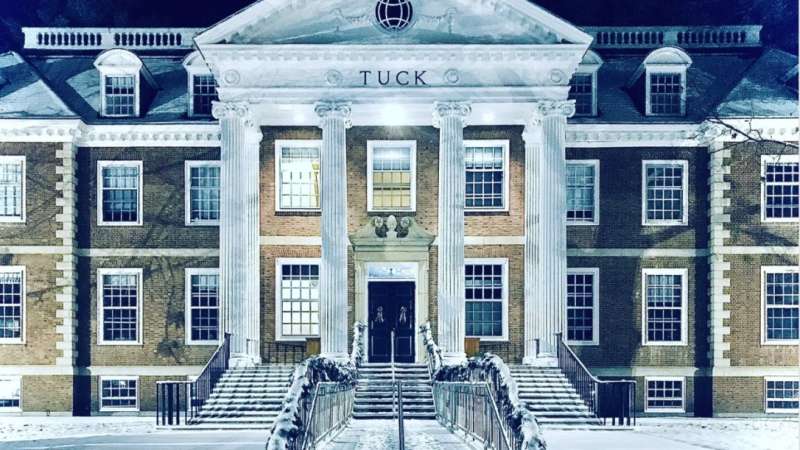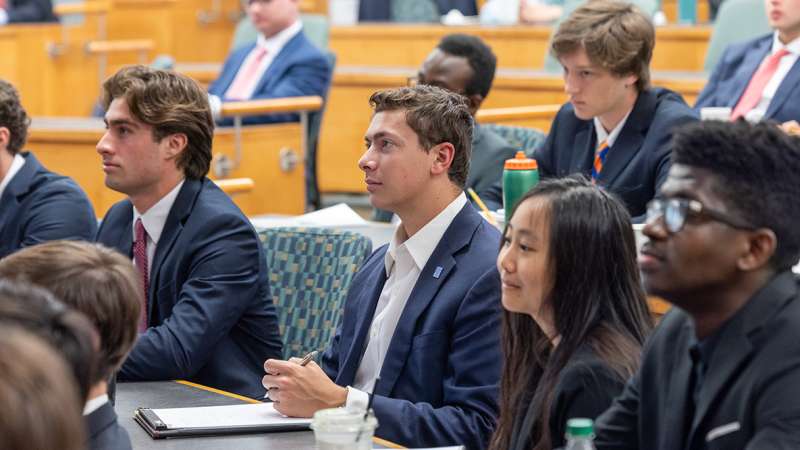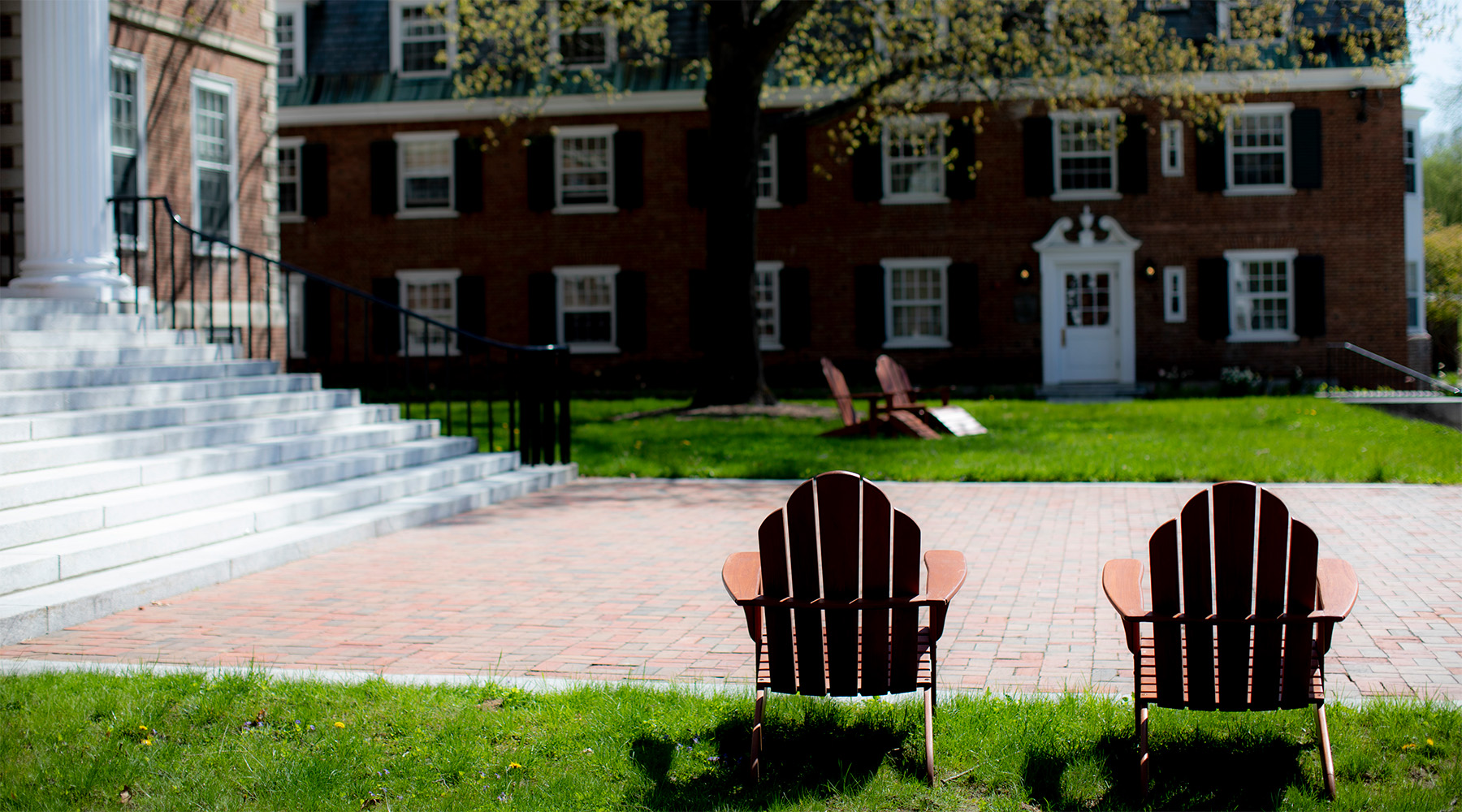
Davidson College Students Reflect on Their Tuck Business Bridge Experiences
This summer, seven Davidson College students came to Hanover to gain valuable business insights through the Tuck Business Bridge Program. They share the highlights of their experiences, key takeaways, and advice for future participants.
ON TUCK’S ACADEMIC EXPERIENCE

Phillip Mann, Davidson’27, Bridge’24
At Tuck Bridge, I not only learned about accounting, economics, finance, and strategy but also applied models to predict a company’s future—a hands-on experience that gave me a significant head start in the business world.
The highlight of my time at Tuck was the capstone project. All the knowledge we gained in class culminated in our valuation and presentation. The final day brought everything together, and completing the program gave me a sense of accomplishment and intellectual growth.
Tuck Bridge is worth it. The work is intense; I’d say it takes more time and effort than the Davidson course load, and the capstone project got nerve-wracking at times, but the professors, MBA fellows, and mentors are all there for you along the way. The faculty makes the program an enjoyable experience while teaching you as much about business as possible in a few weeks.
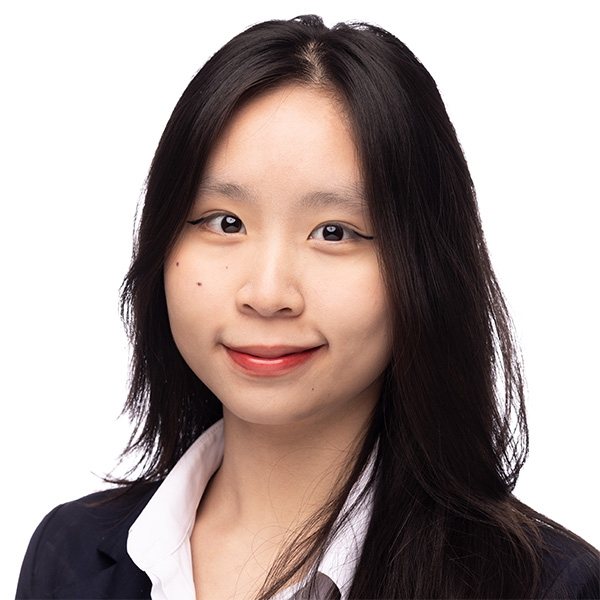
Trang Dang, Davidson’27, Bridge’24
The highlight of my Tuck Bridge experience was the final capstone project, in which my group conducted a valuation and strategic assessment of the fast-casual restaurant chain, Wingstop. We chose Wingstop due to its strong growth driven by its franchise model and effective investments in technology and marketing. We analyzed economic outlooks, industry reports, and company filings to develop a compelling and persuasive thesis for our presentation. Drawing on the knowledge from the accounting, finance, and marketing/strategy courses at Tuck, I collaborated effectively with my teammates to present a comprehensive investment pitch.
This experience enhanced my understanding of business, accounting, and finance while strengthening my communication and teamwork skills. I also made extensive use of the resources available at Tuck. For instance, the library’s Bloomberg Terminal helped me achieve the Bloomberg Markets Concept Certificate, a credential that offers an introduction to financial markets and the terminal’s essential functions. Overall, the skills I developed throughout Tuck Bridge are invaluable as I pursue finance-related career paths.
ON FOSTERING CONNECTIONS AND BUILDING MY NETWORK
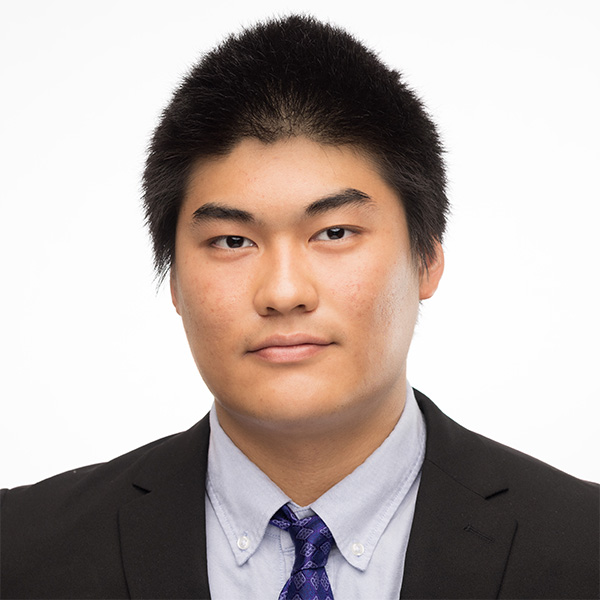
Brian Chung, Davidson’27, Bridge’24
The most surprising aspect of Tuck Bridge was the connections I made. While I expected to bond primarily with fellow sophomores and juniors, the friendships I formed with rising seniors and recent graduates were invaluable. They shared insights from their diverse recruitment experiences, like one participant’s experience overcoming rejection from a consulting internship and how that led him to explore new paths. Another friend shared their experience building a nonprofit in Nepal, and another emphasized that opportunities in finance extend beyond banking and consulting. These conversations broadened my perspective and helped ease my concerns about the future. I believe that learning from those further along in their journeys offers valuable perspectives and often reveals unexpected stories that can enrich your own experience.
One thing prospective candidates should know before applying to Bridge is balancing classes and the group work is intense, but connecting with peers and professors is crucial. I particularly enjoyed discussions with our accounting professor, Katharina Lewellen. She was not only brilliant but also approachable, making complex topics like beta and WACC more accessible. Don’t be intimidated by the professors—they’re highly accomplished but eager to help.
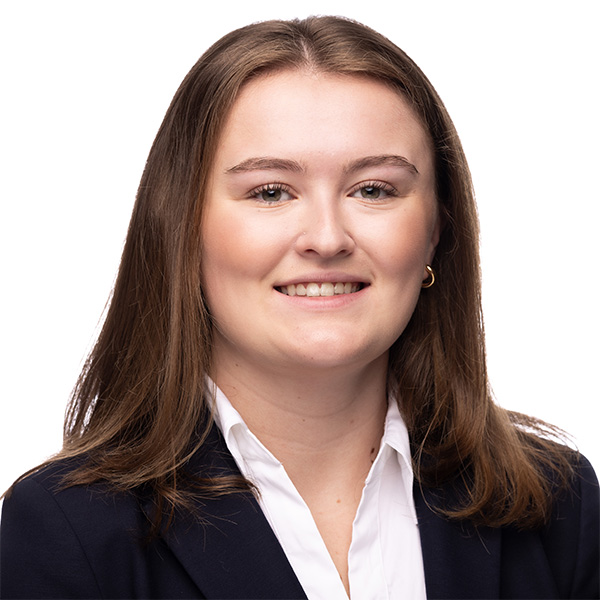
Caroline Mancini, Davidson’27, Bridge’24
I wanted to attend the Tuck Business Bridge Program to gain exposure to more specific industries within finance and consulting and learn technical knowledge not found at my liberal arts college. Specifically, I benefited the most from the corporate finance classes and enjoyed being exposed to business strategy.
The highlight of my Tuck Bridge experience was all the new people I met during the program. Tuck Bridge had students from various backgrounds, some from very technical undergraduate programs, and some who had already completed their collegiate studies and were making a career pivot. I appreciated meeting people with different perspectives on business careers and other students trying to enter the same industry as me with a liberal arts education.
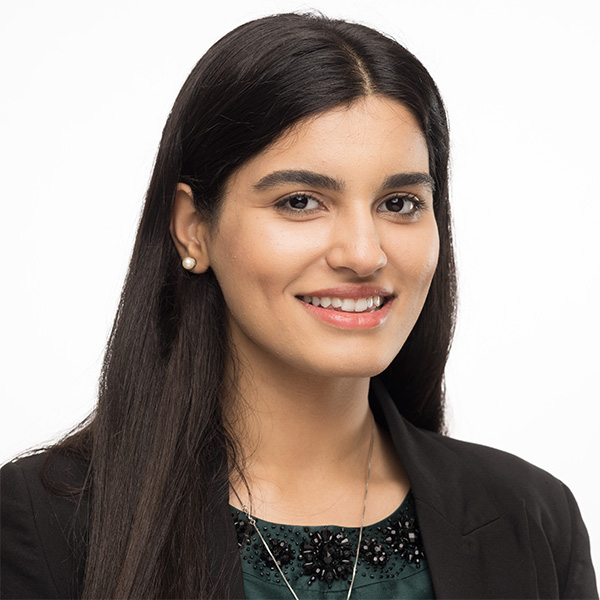
Arshi Husain, Davidson’26, Bridge’24
The Tuck Business Bridge Program exposed me to the financial services industry and gave me extensive insight into what it means to pursue an MBA. I had the opportunity to network with various Tuck alumni and learn about the many paths open to MBA graduates.
I initially applied to Tuck Bridge for its emphasis on teaching qualitative and quantitative corporate valuations. I was pleasantly surprised to learn that many participants came from liberal arts backgrounds and had little to no experience in finance. The supportive environment helped me keep up in the beginner-friendly classes and learn alongside a supportive cohort. Tuck helped me develop my business acumen, make meaningful connections with students from around the U.S., and open my eyes to the wide range of opportunities that exist in the business world. After taking classes in marketing, communications, excel, economics, and finance, I have a clearer understanding of my professional aspirations.
If you’re considering applying but are unsure about pursuing finance, that’s more reason to do it! Tuck offers the perfect opportunity to gain clarity on the professions that interest you and those that don’t.
ON THE VALUE OF TUCK BRIDGE
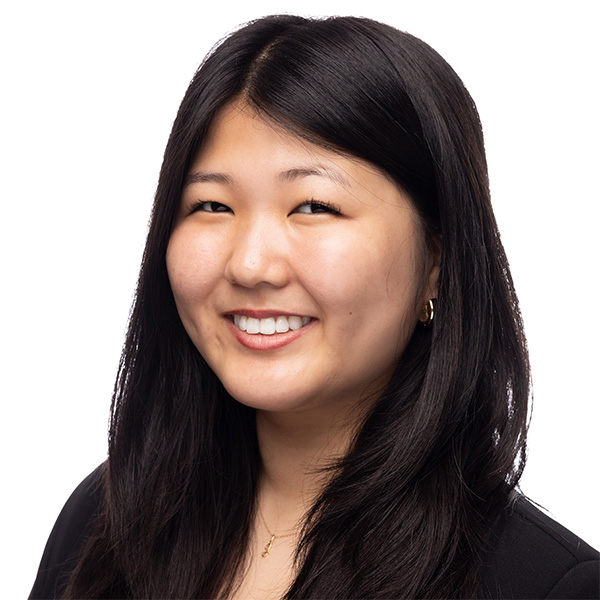
Junah Jeong, Davidson ’27, Bridge’24
Attending the Tuck Business Bridge Program was invaluable to me as a liberal arts student. Unlike students at schools offering dedicated majors in finance and accounting, I knew I needed a way to bridge the gap and gain a competitive edge in breaking into the industry. Tuck Bridge provided the perfect opportunity, allowing those with liberal arts backgrounds to dive deep into finance and business topics while giving us the platform to apply and showcase our newly acquired skills.
Though only three weeks long, the program was incredibly immersive and intensive. Many days stretched from 8 a.m. to 8 p.m. or even longer, but the experience was worth every moment. The opportunity to learn from world-class MBA faculty in such a condensed timeframe was unparalleled. Tuck Bridge not only equipped me with the knowledge and skills I needed but also instilled the confidence to pursue my career ambitions in a highly competitive field.
ADVICE FOR PROSPECTIVE PARTICIPANTS
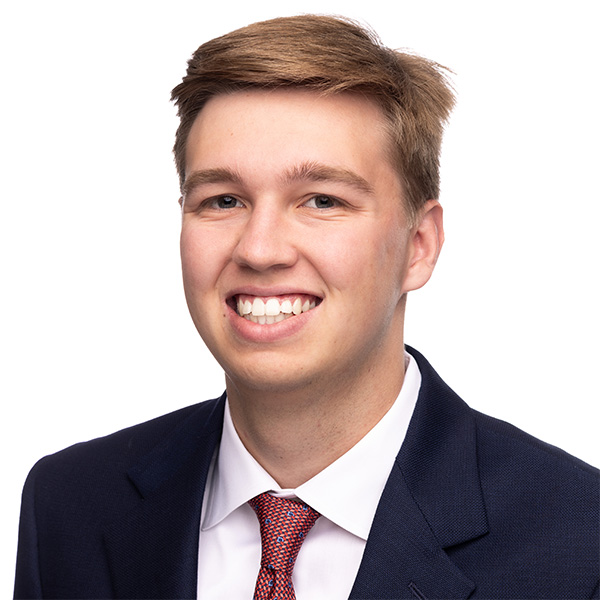
Will Dooley, Davidson’26, Bridge’24
Overall, I thought Tuck Bridge was a great experience. The highlight for me was the capstone project. Not only was the final presentation a great culmination of the program, but I enjoyed working with my group outside of the classroom throughout the process. The phases of the discounted cash flow (DCF) project aligned perfectly with our class lessons, allowing us to apply the concepts to real-world situations.
The classes at Bridge are quite different from those at Davidson. I’ve never been in a class larger than 25 students, so adjusting to lectures with over 60 students was challenging at first. However, I never felt afraid to ask a question or participate, and the professors went out of their way to make the lessons interactive and engaging for the class. The program is tailored perfectly for students from liberal arts backgrounds, as it addresses areas they may not be familiar with. The curriculum assumed that everyone had a baseline theory of economics and then dove deeper into topics like finance and accounting. Additionally, the student body was very diverse, including students from all years of undergrad and some post-graduates.
One piece of advice I’d offer to a prospective student is to come in ready to work. With this program, you get out of it what you put in. Yes, the days can be exhausting, with 6 hours of class, a lunchtime programming session, group project work, and individual homework to end, but everyone must put in their full effort. It can be easy to “slip away” and take the pedal off the gas, but I believe it’s important to take full advantage of the experience and complete all assigned work. At orientation, the program faculty director told us that if we did the program the way it was meant to, we would be exhausted at the end—and she was right!
